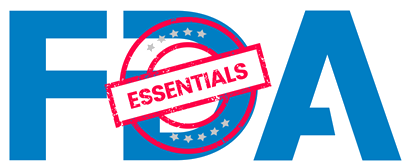Foods

Food Facility Registration
Food Facility Registration
All food facilities manufacturing, packing, or holding food for the US must register with FDA. The last non-US firm to manufacture or pack foods outside the United States must register and designate a U.S. Agent. Get your registration with our easy-to-use portal.
Food facility registration is mandated by the Bioterrorism Preparedness and Response Act of 2002 (the “Bioterrorism Act”) express in regulations at 21 C.F.R. § 1, Subpart H.
Renewals
Food facility registration must be renewed every even numbered year between October 1 and December 31.
Definitions
“Manufacturing/processing” means: making food from one or more ingredients, or synthesizing, preparing, treating, modifying or manipulating food, including food crops or ingredients.
“Packing” means: placing food into a container that directly contacts the food and that the consumer receives.
“Holding” means: storage of food and also includes activities performed incidental to storage of a food (e.g., activities performed for the safe or effective storage of that food, such as fumigating food during storage, and drying/dehydrating raw agricultural commodities when the drying/dehydrating does not create a distinct commodity (such as drying/dehydrating hay or alfalfa)).
Exempt Operations
Foreign facilities when food undergoes further processing at a subsequent facility outside the US.
- Farms (not including a farm that sends processed product other than raw products out into the market)
- Retail Establishments
- Restaurants
- Nonprofits serving directly to consumers
- Fishing vessels
- Meat, poultry, and egg processing facilities regulated by USDA throughout the whole facility.

Label & Claims Review
Label & Claims Review

Claims Review
Claims Review

Nutrition Facts
Nutrition Facts

FSMA Food Safety Compliance
FSMA Food Safety Compliance
Preventive Controls are also known by their longer name “Hazard Analysis and Risk-based Preventive Controls.” Preventive controls require a written food safety plan that details the following elements: (1) hazard analysis – identifying hazards (biological, chemical, or physical), (2) preventive controls to manage or eliminate the hazards, (3) a supply-chain program, (4) recall plan, (5) monitoring program, (6) corrective action procedures, and (7) verification procedures. Food Defense
- Vulnerability assessment – identifying vulnerability of each food type in the facility and include actionable process steps where mitigation strategies can be applied to minimize the risk.
- Mitigation Strategies – application of current scientific understanding of food defense to create strategies to mitigate identified vulnerabilities.
- Monitoring – procedures for making sure that the mitigation strategies are being implemented.
- Corrective Action – procedures for corrective actions that are necessary when mitigation strategies are not being properly implemented.
- Verification – procedures for conducting verification activities to determine whether monitoring and corrective actions are being done, as well as to verify the effectiveness of mitigation strategies.
- Facilities that only hold food, except holding food in liquid storage tanks
- Facilities in charge of packing, re-packing, labeling, or re-labeling food where the container that directly contacts the food remains intact
- Facilities that manufacture, process, pack or hold food for animals
- Farms
- Alcoholic Beverage Manufacturing
- Animal Food Manufacturing
- Very Small Businesses (those businesses, including affiliates and subsidiaries, averaging less than $10 million in sales of human food, plus the market value of human food manufactured, packed or held without sale)

Prior Notice
Prior Notice
- Truck Arrivals: 2 hours
- Rail Arrivals: 4 hours
- Air Arrivals: 4 hours
- Sea Arrivals: 8 hours

LACF/Acidified Food Establishment Registration & SID Filing
LACF/Acidified Food Establishment Registration & SID Filing
Low-acid canned foods and acidified foods are required to register as a food canning establishment (FCE) and file scheduled process filing (SID) with FDA. This is separate from and in addition to food facility registrations. We can help you with your submission.
Low Acid Canned Food
A low-acid canned food (LACF) is food (other than alcoholic beverages) with a finished equilibrium pH greater than 4.6 and a water activity greater than 0.85, excluding tomatoes and tomato products having a finished equilibrium pH less than 4.7.
Acidified Food
An acidified food (AF) is a low-acid food to which acid(s) or acid food(s) are added and which has a finished equilibrium pH of 4.6 or below and a water activity (aw) greater than 0.85.
The rule excludes foods that contain small amounts of low-acid food(s) and have a resultant finished equilibrium pH that does not significantly differ from that of the predominant acid or acid food, and foods that are stored, distributed, and retailed under refrigeration. Notable examples are: carbonated beverages, jams, jellies, preserves, acid foods (including such foods as standardized and nonstandardized food dressings and condiment sauces).
Registration Requirements
The food canning establishment (FCE) filing requires the facility name, address, country, telephone number, and a list of all of the scheduled processes at the location.
The process filing requires detailed information about the food, container, and the process applied.
A scheduled process is the heating process used by the manufacturer to achieve commercial sterility. FDA requires that the process be at least equivalent to the process established by a competent processing authority to achieve commercial sterility.
“Commercial sterility” means that the heating process has rendered the food free of
- microorganisms capable of reproducing under non-refrigerated conditions and
- viable microorganisms (such as spores) of public health significance.

USDA Permits
USDA Permits
US Customs and USDA require permits to import foods containing certain animal or plant origin ingredients of concern. Veterinary service permits (“VS Permit”) for animal products and Plant Protection and Quarantine (“PPQ Permit”) for plants.. Let us evaluate your product and get you the right permit.
Veterinary Service Permit (“VS Permit”)
Common foods requiring VS Permits are products with uncooked eggs (e.g., salted eggs), products with a mix of milk and egg (e.g., uncooked pastries), and bovine gelatin ingredients from certain countries. But there are many more products that require a VS Permit.
A VS Permit is required for foods containing animal-origin ingredients that pose a potential threat to spread disease to animals in the U.S. Once issued, a VS Permit lists the controls or treatments required to ensure that the food will not spread a disease in the U.S. The permit will almost always require the importer to also obtain a veterinary health certificate from the government of the shipping country. The health certificate will certify that the controls or treatments detailed in the permit were performed.
Failure to have a VS Permit and/or the corresponding veterinary health certificate will lead to U.S. Customs and Border Protection issuing an Emergency Action Notice (“EAN”) requiring the exportation of the food within a few days. In some cases, an On Hold Shipment Filing and Emergency Permit can solve the issue, but typically the product will have to be exported or destroyed.
VS Permits are renewed annually.
PPQ Permits
A PPQ permit is for plants that are known to potentially carry pests. This includes fresh fruits and vegetables, certain miscellaneous plant items, and even endangered plant permits. These permits typically last for three-years.
